My birthday is on Monday, so I'm writing this early in preparation for max long weekend enjoyment. My husband has some kind of mystery overnight hike planned that we'll have finished by the time you read this unless a bear has attacked us, which is not a totally unreasonable (although statistically unlikely) fear.
I get reverse seasonal depression in the summer because all the best hikes are too crowded, I have whatever blood type mosquitos are obsessed with, and I don't do well in hot weather. I love being outside, but it's deeply unpleasant for me until September when those crispy evenings roll around and I can comfortably wear a sweatshirt without experiencing heatstroke. After a 3-month, air-conditioned slumber, it's nice to come back alive. For a brief window, I optimistically believe my depression is merely seasonal (lol no).
What have I learned/how have I changed in the past year? I've certainly become more:
- Existentially nihilistic
- Protective of my time and energy
- Appreciative of small things
I've also become less:
- Willing to uphold other people's longstanding delusions
- Conflict-averse
- Judgmental
This year, I'd like to foster cats and send even more snail mail. These are two minor goals I can easily uphold, so I'm setting myself up for success. Here's to another trip around the sun and the secret hope that Bea and Gink make me the world's largest pizza.
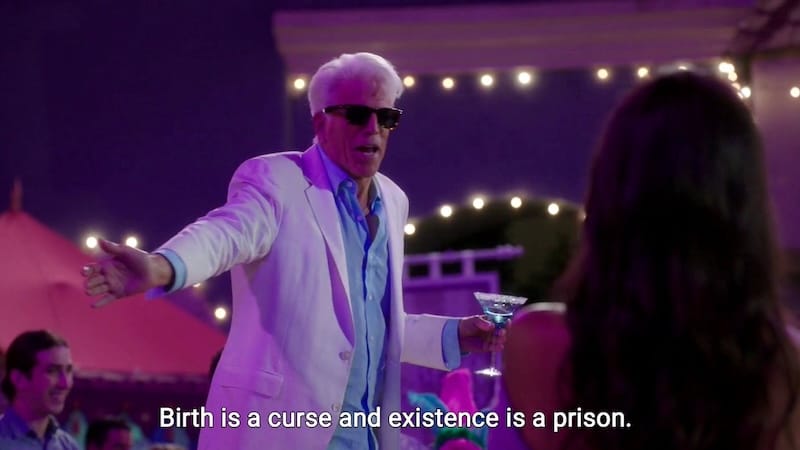
With "The Mastermind" coming out next month, my triennial Kelly Reichardt rewatch is now in full swing. This time around, I have a much greater appreciation for "Night Moves," her fifth feature, and the first one shot on digital (for budget reasons, natch). The film is about a trio of assholes — Josh (Jesse Eisenberg), Dena (Dakota Fanning) and Harmon (Peter Sarsgaard) — who come together to blow up a hydroelectric dam. What do they think this act of ecoterrorism will accomplish? Unclear, but Josh is angry at people for "killing all the salmon just so you can run your fucking iPod every second of your life." The film is primarily shot from his perspective, which Eisenberg infuses with the pretension of the guy at the back of an Environmental Science 101 class who wears the same unwashed clothes every day and side-eyes anyone with a cellphone. The first half of the film revolves around the planning and execution of the crime; the second half deals with the fallout.
When "Night Moves" came out in 2013, critics treated it like a lesser film in the Reichardt oeuvre, often failing to grasp the humor, and finding the characters opaque and annoying as if they weren't written this way (by Reichardt and frequent collaborator, Jonathan Raymond) on purpose. You think Reichardt has respect for Josh, the dipshit who decides to commit a federal crime without first completing rudimentary prep work like oh, I don't know... ensuring his accomplice doesn't have a criminal record? If you aren't sure how Reichardt feels about him, it's obvious when, after the explosion, a police officer stops Josh and asks to examine the bed of his truck. When she opens a large container full of vegetables, he mansplains CSAs to her as if anyone living in Oregon wouldn't understand the concept.
Reichardt knows the criminals in her film are lacking brain cells. They are idiots who desperately want the illusion of doing something meaningful to lend credence to their smug sense of superiority. They are worse than the elderly people in their camper van, destroying the serenity of nature with "The Price is Right." At least those game show enthusiasts probably aren't under any delusions that they have the power to enact change via an ill-conceived act of destruction. They aren't sitting there thinking about how disgusting other people are for merely existing within an imperfect system. Josh conceives of himself as a revolutionary back-to-the-land type guy when really, he's a bro-douche with rage issues in desperate need of a therapist.
"Night Moves" isn't a perfect film, but it's so much better than anyone gave it credit for at the time. When I was talking to Alex Heeney about this, she had some good insights:
I feel like after "The Social Network" everyone just threw stones at Eisenberg at every opportunity because he played unlikable characters and they couldn’t separate the actor from the character. People thought he was bad in "Louder Than Bombs," too, which they also thought was bad probably in part because the characters were all a bit difficult. Also "Night Moves" was 2013? So the critical establishment was all men and they saw maybe three movies a year directed by a woman.
Because it's Alex, she then of course immediately fact-checked herself on the "three movies a year" comment, but the general sentiment stands: the critical establishment underrated this movie because they didn't understand it, and I think it deserves a reevaluation.

Watch if you like: "Leave No Trace," Patricia Highsmith, "The Mountain Lion," watching people get psychologically punished for their hubris.
I've written previously about how I use YouTube as a makeshift SSRI when life sucks. I'm not proud to admit this, but I've definitely spent upwards of 60 minutes watching my favorite "RuPaul's Drag Race" lip syncs until 1am on a weekday. There is no science to support this, I just believe deep down in my soul that Roxxxy Andrews's "back off" gives me enough serotonin to weakly limp through the work day. Sometimes, when I exhaust myself on dog grooming videos and drag queens, I must turn to the king of choreography: Bob Fosse.
In an ideal world, I would just rewatch "All That Jazz" or "Cabaret." When I don't have time to do that, these are the numbers I rely on to get my fix:
- "The Rich Man's Frug" from "Sweet Charity"
- "From This Moment On" from "Kiss Me Kate"
- "Steam Heat" from "The Pajama Game"
- "Who's Got the Pain" from "Damn Yankees" (choreographed with Gwen Verdon)
- "If My Friends Could See Me Now" from "Sweet Charity," performed (and co-choreographed) by Gwen Verdon on "The Ed Sullivan Show" (fun fact: this was used as the theme song on the pilot of "The Nanny")
Thanks to "Fosse/Verdon," more people recognize how integral Verdon was to Fosse's success, and compiling this list made me realize that Carol Haney deserves the same treatment. She's in "Fosse/Verdon," played by Kelli Barrett, but her life was interesting enough to warrant a solo project. If not for Hollywood's fuckery and her untimely death at the age of 39, she would have been a big star.
And for good measure, here are Haney and Fosse on "The Ed Sullivan Show"
If you like being stressed out, Alice Winocur's "Disorder" is a great way to spend 98 minutes. I watched it for the first time this week and at no point did I feel confident about where it was headed. Vincent (Matthias Schoenaerts) is a French soldier suffering from PTSD after returning from Afghanistan. While waiting to be cleared for redeployment, he works odd security jobs for a friend. One of these gigs leads him to a party at the estate of a diplomat named Imad Whalid (Percy Kemp). From the jump Vincent seems to distrust him, zooming in on the documents lying on his desk and keeping tabs on his closed-door conversations. It's unclear if his paranoia is warranted or if his heightened stress response has led to hypervigilance.
When Whalid gets called away on last-minute business and Vincent is hired to protect his wife (Diane Kruger) and child, the tension ratchets up and somehow doesn't cease even when the biggest questions have been answered. The film is a thriller with plenty of fight scenes, but the traditional genre conventions never come at the expense of character development or more complex thematic overtures. While rarely explicitly stated, "Disorder" has a lot to say about class differences, trauma, and romance born from dysfunction.
What impresses me most about this film is how much it wordlessly communicates. Winocour wrote the role of Vincent specifically for Schoenaerts because of his physicality as an actor, and it is by far one of his best roles. The film's sound design is likewise fantastic, allowing the audience to experience what it's like to be in Vincent's head, dealing with post-war hearing loss that adds increased uncertainty to his/our interpretation of events. This film has a criminal 3.2 stars on Letterboxd: proof that if you're deciding whether or not to watch something based on popular opinion, you'll miss out on tons of good shit. Stop letting algorithms and/or groups of random-ass people on the internet dictate how you consume media. Watch something because you find it interesting or because someone you know/trust recommended it. Fight the homogenization of art, otherwise we'll all be stuck with soulless AI nonsense that data says we should enjoy.
Watch if you like: "You Were Never Really Here," "Drive," "Black Bag," "The Secret History," intriguing anxiety, Matthias Schoenaerts at the top of his game.
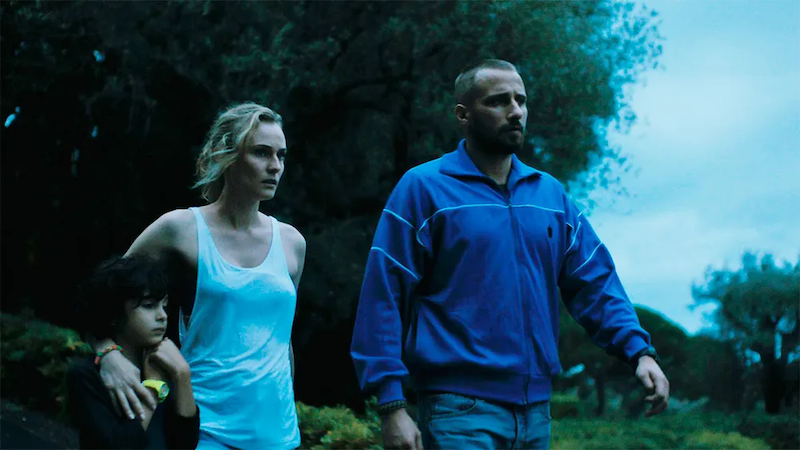
No matter how you feel about "Closer," I hope we all can agree Mike Nichols deserves a hat tip for "All hail the sultan of twat." I also love when Larry (Clive Owen) snarls, "Go fuck yourself, you writer" at Dan (Jude Law) in a moment of total disgust over his romanticized bullshit. To anyone who missed the days of anonymous sex chat rooms, I'm sorry you will never know the pleasure of typing things like, "wait have 2 type with 1 hand am cumming right now" next to a grainy image of people boning atop the Union Jack. If you're wondering at this point whether I'm one of those "Closer" sickos, the answer is duh. Give me attractive, insufferable people talking at each other in rooms, tonal weirdness, and Ann Roth costumes; I want nothing more.
Adapted by Patrick Marber from his 1997 play with the same name, "Closer" is about a four-way love triangle between Larry, Dan, Alice/Jane (Natalie Portman), and Anna (Julia Roberts). It's dark, cynical, sexy, more humorous than you might think at first glance, and often referred to as an anti-romcom. It's one of those movies that makes people flippantly remark, "Someone should tell them about polyamory," as if people who can't communicate at the most basic level are well-suited to non-monogamy. As with Reichardt's "Night Moves," every character is irritating, so I have to be in the right mood to watch it. It's also very clearly adapted from a play, so you either have to embrace the stilted dialogue or spend the entire runtime annoyed.
This time around, I was struck by how good Portman's performance is (she lost Best Supporting Actress at the Oscars to Cat Blanchett). It helps that her character is by far the best written and the only one who experiences legitimate growth, but she infuses Alice with an air of mystery and several layers of damage that take her well beyond the cliched "stripper with a heart of gold" archetype. The way Portman plays it, you get the sense that she's developed specific armor to protect herself from the horrors of humanity. When people disappoint her, which they probably always do, she's made it easy to disappear without a trace. Is it the healthiest behavior? No, but moving forward is far better than sticking around and repeating the same toxic patterns with the same toxic people ad nauseam until death. Keeping the ending vague (unlike the play) opens up a few different interpretations of Alice's fate. Maybe it's a redux of the opening scene with another Jude Law waiting in the wings, or maybe the cycle of dysfunction has reached completion.
Watch if you like: Objectionable characters, "Eyes Wide Shut," "Mad Men," being reminded of why you violently loathe Damien Rice's "The Blower's Daughter," films that feel totally insular despite being set in major cities.
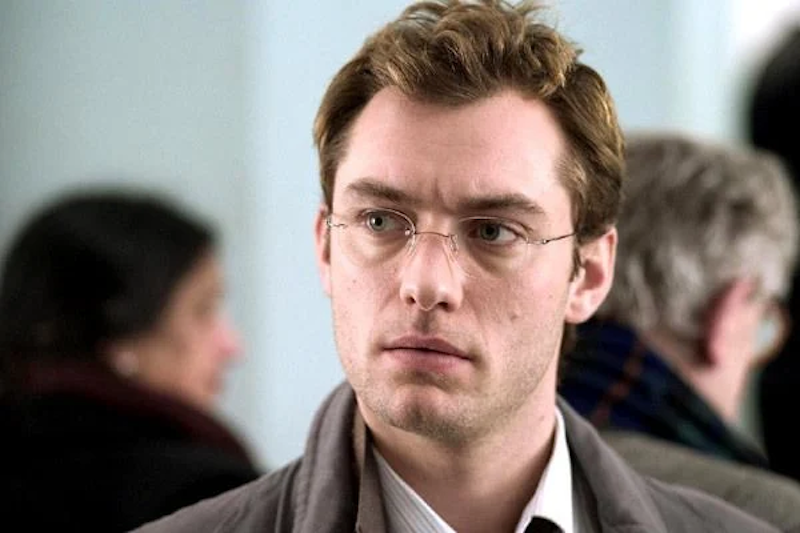
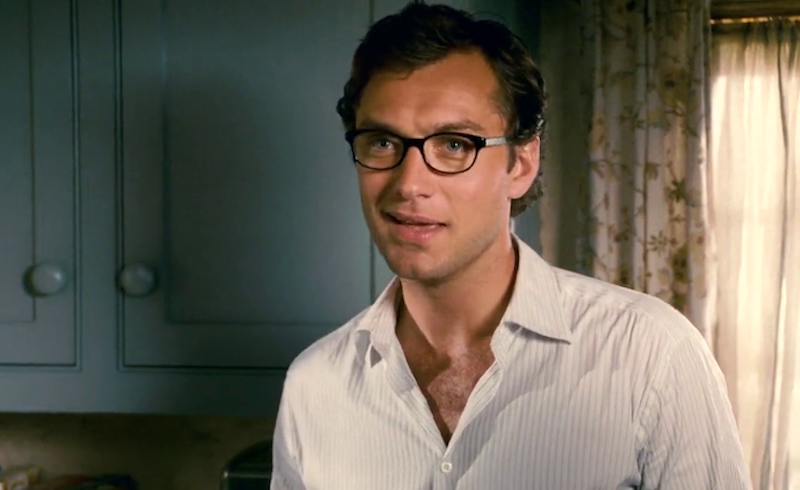
Can Jude Law please wear more cunty little glasses? We deserve it. "Closer" (l) and "The Holiday" (r).
I watched every film mentioned in this newsletter on Kanopy, which you likely have access to via your local library (or university for employees and students). Tons of great movies and tv shows are available on this streaming service, sans commercials, and it's a resource I suspect many people are severely underutilizing. The selection varies depending on your organization, but here are some great things currently available on (my) Kanopy:
- "Alma's Not Normal"
- "45 Years"
- "Possession"
- "Jeanne Dielman, 23 Commerce Quay, 1080 Brussels"
- "A Girl Walks Home Alone at Night"
I've touted the benefits of the library before, and I'll do it again, goddammit. Along with Kanopy, my library gives me access to Libby/OverDrive (for ebook rentals, tons of magazines and newspapers) and many museums in the area, including Storm King, MoMA, and the Guggenheim. A quick internet perusal tells me this is a benefit many libraries offer. My hometown outside of Pittsburgh does something called the RAD Pass, where a library card is used to register for free or discounted tickets to events, like the opera and baseball games. The library has always been a great, underrated public service and they need our support now more than ever. I don't want to live in a society where people don't have free and easy access to books and movies. Imagine how fucking awful it would be if everyone you encountered was as illiterate/unimaginative as Donald Trump. Let's safeguard our future from this hellish possibility while we still have the chance.
(In liberal killjoy fashion, I am obligated to tell you there are ethical concerns with OverDrive, Kanopy, and Libby because of course there is no ethical consumption under capitalism, womp womp.)
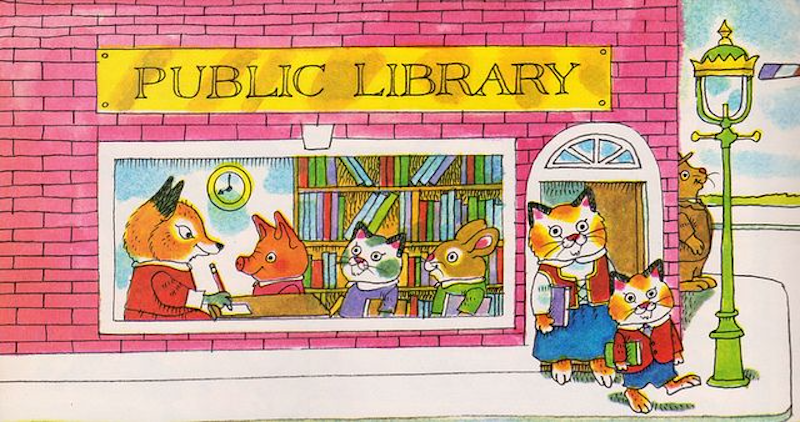
NYC people, there are two important film retrospectives running right now:
- Chantal Akerman at MoMA through October 16
- Terence Davies at Museum of the Moving Image through September 21
Let me know if you're attending any screenings. Surly disposition aside, I promise that I am a nice person unless your vibe is aggressively off-putting.





